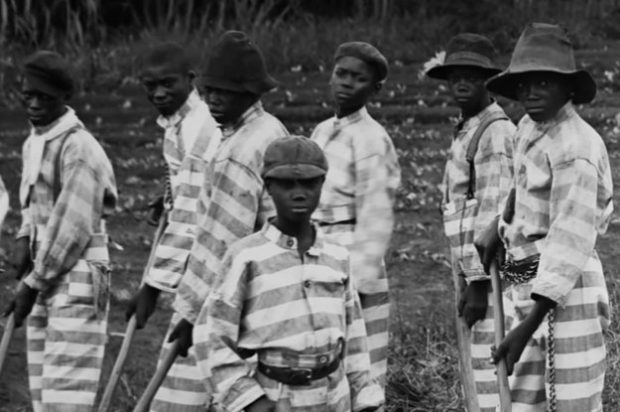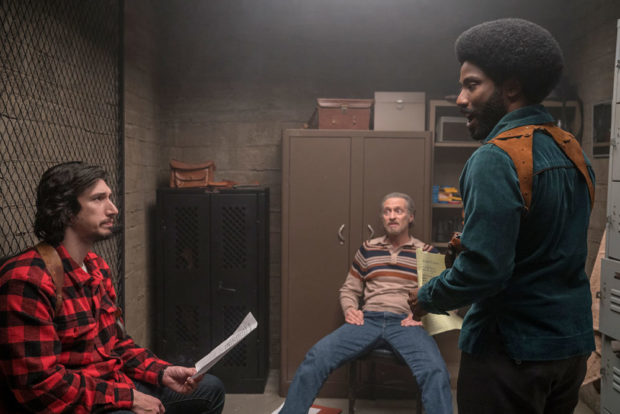

Ava DuVernay’s 2016 documentary traces the history of incarceration as a tool of white supremacy in America, while Spike Lee’s latest provocation uses the real case of a black cop infiltrating the KKK in the ’70s to show the insidious racism still infecting the nation today.
13th, a 2016 documentary directed by Ava DuVernay, starts with some alarming facts. The U.S., with 5% of the world’s population, houses 25% of the world’s prisoners. And one out of four African American men will do prison time at some point or other in their lives. From there we move to the film’s central idea from which it gets its title. The 13th Amendment to the Bill of Rights, passed in 1865, abolished slavery in the United States, except (and this is the key point) as punishment for a convicted crime. The former Confederate states, left in ruins by the Civil War, could no longer use slave labor to run their economy. So they used the language of the 13th Amendment as a loophole. Black people would be arrested for minor or trumped-up charges, given unfair lengthy sentences and then put in chain gangs that would work for private companies under a system of convict leasing.
Later, the system of segregation was put into place in which black people’s right to vote was taken from them and inferior social and economic conditions imposed on them. By the turn of the century, this status became the de facto social order in the North as well, enforced by law, and by terror in the form of widespread lynching. Then, after the victories of the civil rights movement in the ‘50s and ‘60s, white supremacists changed their rhetoric and tactics, making crime and criminals the code words for racial categories they could no longer say out loud. The creation of a war on drugs, along with the prompting of an occupier mentality in urban police forces, resulted in an explosion of the prison population, in which the majority of the inmates are people of color, despite being less than 20% of the population.
This cursory description can’t do justice to the voluminous footage, scores of interviews and complex supporting materials that make up this excellent film. DuVernay paints a full and convincing picture of the continuing crisis of mass incarceration, and the damage it has done to our society, while exploding the myth that racism is no longer a problem. 13th was produced by Netflix and is available on that platform, and on DVD.
On the more flamboyant side of things, Spike Lee’s latest picture, BlacKkKlansman, dramatizes the true story of a black police officer in Colorado Springs named Ron Stallworth, played here by John David Washington, who in 1972 saw a recruitment ad for the Ku Klux Klan and called their number pretending to be a white guy hoping to join them. He succeeded in fooling them into allowing him to join, with a white fellow officer, played by Adam Driver in the film, meeting the KKK in person when that was required. Stallworth even established a friendship by telephone with the national director, David Duke.
 Well, no one would ever accuse Spike Lee of being subtle. BlacKkKlansman can be cartoon-like in its use of a 1970s police movie parody style to propel the plot, and it includes a few things that never happened, along with some over-the-top acting, especially by the guys playing KKK villains. (An exception is Topher Grace, with an impressively modulated performance as David Duke.) On the other hand, Lee’s didactic impulses can be stunningly effective—a sequence in which a Klan initiation ceremony is intercut with a civil rights veteran, played by Harry Belafonte, relating during a church gathering the true story of a brutal lynching—is a masterpiece of tension.
Well, no one would ever accuse Spike Lee of being subtle. BlacKkKlansman can be cartoon-like in its use of a 1970s police movie parody style to propel the plot, and it includes a few things that never happened, along with some over-the-top acting, especially by the guys playing KKK villains. (An exception is Topher Grace, with an impressively modulated performance as David Duke.) On the other hand, Lee’s didactic impulses can be stunningly effective—a sequence in which a Klan initiation ceremony is intercut with a civil rights veteran, played by Harry Belafonte, relating during a church gathering the true story of a brutal lynching—is a masterpiece of tension.
Lee refuses to hold back in his indictment of white supremacy, opening with a cut from Gone With the Wind, and using the 1915 film The Birth of a Nation to show how American movies themselves were used to solidify hatred and oppression. The ending draws a straight line to the present day. BlacKkKlansman may seem contrived as drama, but as social critique it hits home pretty hard.

